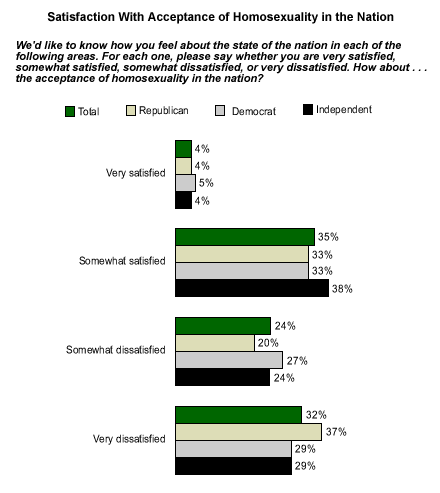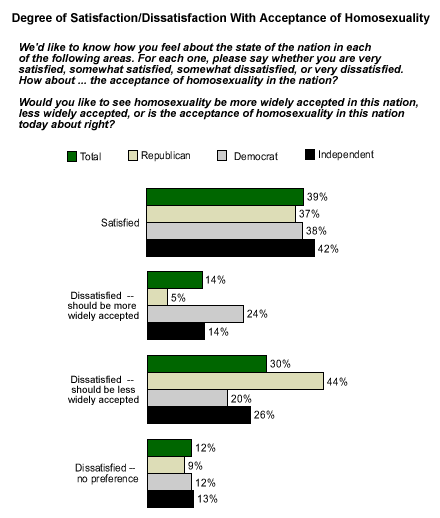There are many issues competing for consideration in the upcoming presidential election -- most notably the war in Iraq, the economy, terrorism, the deficit, healthcare reform, and education reform. But on May 17, at least, gay marriage will probably be the most talked-about issue. That's the day Massachusetts is set to issue legal marriage licenses to same-sex couples, and if gays start marching two by two from all over the country to Bay State altars, gay rights could become a more prominent election issue.
So, it may be useful to examine attitudes about homosexuality by political party to find out where any divisions lie. A January 2004 Â鶹´«Ã½AV Poll* conducted before local officials in California and New York married gay couples to challenge the state laws, found about 4 in 10 Americans (39%) were satisfied with the level of acceptance of homosexuality in the nation -- 4% were "very satisfied" and 35% were "somewhat satisfied." The majority of Americans (56%) were dissatisfied -- 24% "somewhat dissatisfied" and 32% "very dissatisfied." Interestingly, despite all the media attention focused on gay rights issues over the past year, these numbers have been relatively stable since Â鶹´«Ã½AV began asking the question on an annual basis in 2001.

Which Direction Should the Nation Take?
The responses to this question indicate that similar proportions of Republicans, Democrats, and independents were dissatisfied -- but the responses say nothing about the reasons for their dissatisfaction. So a subsequent question asked Americans if they think homosexuality should be more widely accepted, less widely accepted, or if the level of acceptance is about right. An analysis of respondents' answers to this question, in conjunction with their initial expressions of satisfaction or dissatisfaction with homosexuality in the nation, reveals how divisive the issue is.

While 39% of Americans said they are satisfied, 30% were dissatisfied and said homosexuality should be less widely accepted in the United States. Fourteen percent, on the other hand, were dissatisfied and said homosexuality should be more widely accepted, and 12% said they are dissatisfied but also said the levels of acceptance in the United States are about right.
The results by political party show that a plurality of Republicans, 44%, were dissatisfied with the acceptance of homosexuality in the nation and said it should be less widely accepted. Just 5% of Republicans were dissatisfied and said it should be more widely accepted, and 9% were dissatisfied but said the acceptance level is about right. Thirty-seven percent of Republicans were satisfied.
Thirty-eight percent of Democrats were satisfied with the acceptance of homosexuality. Twenty-four percent of Democrats expressed dissatisfaction and favored a wider acceptance of homosexuality; nearly equally as many said they are dissatisfied but favor less acceptance (20%). Twelve percent of Democrats said they are dissatisfied but also said acceptance is about right.
Like Democrats, the plurality of independents were satisfied with society's acceptance of homosexuality. But like Republicans, dissatisfied independents were more likely to say homosexuality should be less widely accepted (26% of independents held this view) than say it should be more widely accepted (14%).
Bottom Line
The central finding of these data is that in January, more Americans were dissatisfied than satisfied with the acceptance of homosexuality in America. In February, Â鶹´«Ã½AV asked Americans how important the presidential candidates' positions on same-sex marriage would be in influencing their votes: 67% said the issue would be at least somewhat important, while 31% said the issue would not be important at all. While this stated importance paled in comparison to that of other issues such as Iraq and the economy, the continuing legal battles over gay marriage may be enough to sway some swing voters in what promises to be a tightly contested election.
*Results are based on telephone interviews with 1,004 national adults, aged 18 and older, conducted Jan. 12-15, 2004. For results based on the total sample of national adults, one can say with 95% confidence that the margin of sampling error is ±3 percentage points.
